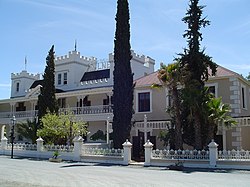Matjiesfontein
Matjiesfontein | |
|---|---|
 Lord Milner Hotel in Matjiesfontein | |
| Coordinates: 33°13′59″S 20°34′58″E / 33.23306°S 20.58278°E | |
| Country | South Africa |
| Province | Western Cape |
| District | Central Karoo |
| Municipality | Laingsburg |
| Government | |
| • Councillor | Aletta Theron[1] (DA) |
| Area | |
• Total | 1.22 km2 (0.47 sq mi) |
| Population (2011)[2] | |
• Total | 422 |
| • Density | 350/km2 (900/sq mi) |
| Racial makeup (2011) | |
| • Black African | 1.2% |
| • Coloured | 97.6% |
| • White | 0.7% |
| • Other | 0.5% |
| First languages (2011) | |
| • Afrikaans | 97.4% |
| • Tswana | 1.2% |
| • Other | 1.4% |
| Time zone | UTC+2 (SAST) |
| PO box | 6901 |
| Area code | 023 |
Matjiesfontein is a settlement in Central Karoo District Municipality in the Western Cape province of South Africa.
History
[edit]
The original inhabitants of the region were the Khoikhoi herders and the San hunter gatherers. Following the arrival of the early European colonists, the area was settled by Afrikaner Trekboers and Griqua people.
Railway origins
[edit]The town itself owes its existence to the Cape Government Railways, and to the route that their founder, Cape Prime Minister John Molteno, chose for a railway line that would connect Cape Town's port to the diamond fields of Kimberley. The Royal Commonwealth Society (1898) records that in a meeting with his consulting engineers, the Prime Minister called for a map of Southern Africa to be brought to him and, taking a ruler, drew his pen along it from Cape Town all the way inland. He then handed the map to the engineers, telling them to build the railway accordingly. [3][4]
The line rapidly extended inland, and a station was built on 1 February 1878, that was named "Matjiesfontein". The name was derived from a type of sedge, Cyperus textilis, used by Khoekhoen to make mats (matjies) employed in the construction of their huts.[5]
Logans refreshment station
[edit]Originally, Matjiesfontein was only a small depot and farm, however a Scotsman by the name of James Douglas Logan, who was superintendent of this stretch of railway, bought land at Matjiesfontein, moved there because of his weak chest, and opened a refreshment station for the passing trains. This was so successful that the business soon formed the nucleus of a growing village. Logan was unintentionally very influential in South African history as he had secured the catering contract for the railways through his friend in parliament, James Sivewright, and discovery of the corruption involved led to the fall of the first government of Prime Minister Cecil Rhodes in 1893.[6][7] Logan was also considered to be one of the founding fathers of South African cricket.[8]
Development and layout
[edit]A town was laid out in the 1880s, and formally purchased in 1968 to be preserved for its Victorian charm. The whole town was declared a National Monument on 12 September 1975,[9] the railway station on 15 December 1989 and the cemetery on 23 September 1994.[10][11] The cemetery houses the graves of British Army Major-General Andrew Wauchope (1846–1899) and English cricketer George Lohmann (1865–1901). In 2022, a new ground station for NASA's lunar exploration program was announced to be under construction in Matjiesfontein, scheduled to come online in 2025. [12][13]
Location and surrounds
[edit]The town of Matjiesfontein is located 27 km west of Laingsburg and 54 km east of Touwsrivier on the N1 national route. The surrounding Karoo region is a flat, sparsely populated semi-desert. Matjiesfontein has a healthy climate for people with lung complaints, and was once home to a Victorian spa and health resort.[14]
See also
[edit]References
[edit]- ^ Laingsburg Municipality - Aletta Theron
- ^ a b c d "Main Place Matjiesfontein". Census 2011.
- ^ Royal Colonial Society: Proceedings of the Royal Colonial Institute. Northumberland Avenue, London. 1898. p.26. "The Railway System of South Africa".
- ^ C. Schoeman: The Historical Karoo: Traces of the Past in South Africa's Arid Interior. Penguin Random House South Africa. 2013. ISBN 1770225684
- ^ "Dictionary of Southern African Place Names (Public Domain)". Human Science Research Council. p. 301.
- ^ Burman, Jose (1984). Early Railways at the Cape. Cape Town. Human & Rousseau, p.58. ISBN 0-7981-1760-5
- ^ "Olive Schreiner Letters Online".
- ^ DHOLE, Pradip (6 February 2018). "James Douglas Logan: The "Laird of Matjiesfontein"". Cricket Country. Retrieved 18 May 2019.
- ^ "Matjiesfontein Village - 9/2/058/0001". South African Heritage Resource Agency. Archived from the original on 28 November 2012. Retrieved 16 September 2012.
- ^ "Railway Station building, Matjiesfontein - 9/2/058/0002". South African Heritage Resource Agency. Archived from the original on 29 November 2012. Retrieved 16 September 2012.
- ^ "Matjiesfontein Cemetery - 9/2/058/0004". South African Heritage Resource Agency. Archived from the original on 3 December 2012. Retrieved 16 September 2012.
- ^ Roelf, Wendell (9 November 2022). "South Africa's new ground station to help NASA track space flights". Reuters. Retrieved 17 November 2022.
- ^ Deborah Faboade (8 November 2022). "South Africa and NASA Renew Lunar Exploration Partnership". Space in Africa.
- ^ http://www.essentialtravelinfo.com/route2.html



